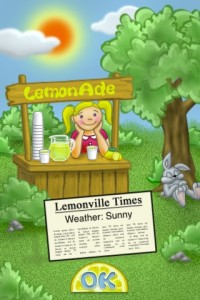I am not sure if it works this way in other academic institutions but at mine we have an annual performance review whereby we are assigned subjective statements that we either are below, exceed or meet expectations on various criteria. The system has settled down to a situation where 80-90 percent of faculty get "meets expectations" on any given criterion. Suffice to say, no one is really sure quite what their expectations are and, for the most part, don't really seem to worry about it.
Apparently, the issue happens in parenting. In this case, however, it is parents constantly expecting things of their children and then evaluating whether their children meet those expectations. Suffice it to say, there are lots of below expectations reviews coming in. In
Slate,
Alan Kazdin says that this is likely the fault of the expectations rather than the children.
Because parents love their children and want the best for them, they worry about them a lot, and one of the things that parents worry about most is whether their children are hitting age-appropriate targets for behavior. Shouldn't a child be toilet trained by the age of 4? Should a 10-year-old to be able to sit down and do an hour of homework? One reason why such questions produce so much conflict and woe in the home is that parents' expectations for their children's behavior tend to be too high. I'm not talking about permissiveness or strictness here; I'm talking about accurately estimating children's actual abilities. A reliable body of research shows that we expect our children to do things they're not yet able to do and that we judge and punish them according to that expectation.
This resonates with me precisely because we fell into this whole trap. Child No.1 was subject to issues associated with high expectations. We didn't know what to expect at various ages and so we decided to expect everything. Sadly, for Child No.1, on many initial stuff she meet those expectations, causing us to continue that pattern.
All this wasn't helped by the fact that when we looked at parenting books that had 'milestones' she appeared to be exceeding those. Being an economist, I decided that those books were likely wrong and that they were, on purpose, downgrading milestones to sell more books. I imagined parents browsing in the bookstore and saying, "look honey, according to this one our 3 month old has the gross motor skills of a 6 month old. Let's buy this one." Any respectable publisher looking to maximise sales would surely go for the low threshold milestones.
So, as I said, Child No.1 did quite well but much of that was also due to our selective milestoning. According to one of those books, at 8 months, "your child should be able to do pat-a-cake." I was concerned, I didn't think she could do pat-a-cake. We discussed it and worked out that this was likely because we didn't know how to do pat-a-cake. So we ignored that one.
But it was on reading that all of this caused us problems. Child No.1 learned her letters quickly and could draw them on command at Age 2. So we expected that reading was just around the corner. But that wasn't to be. She learned to read around ages 5 and 6 when most kids do. The problem is that caused us years of angst until at age 4 we decided we were the problem and abandoned all reading efforts. Turns out that wasn't such a good idea either and we should have been doing something. Then again, what we really found out is that we knew nothing and even if we did, it wouldn't have done much.
With Children Nos.2 and 3, we gave up all expectations. This has helped immensely. When it comes down to it, most kids do eventually do whatever it is they are supposed to. And if they don't some authority/teacher figure will tell you. That said, that I expect my near 8 year old son might someday actually get his wee into the toilet at something close to 100 percent efficiency rather than his current 70 percent is surely not that much to ask. And when he misses that he might do something about it rather than leave a puddle and smell is surely within the coveted "meets expectations" level? I guess I need to tie his pay to extra-toilet wee levels if those could be measured.

